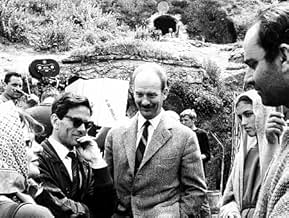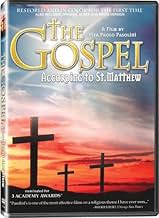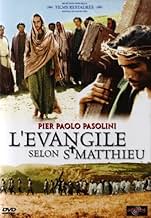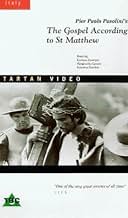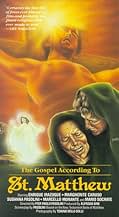VALUTAZIONE IMDb
7,6/10
14.618
LA TUA VALUTAZIONE
Segui la vita di Gesù Cristo secondo il Vangelo di Matteo.Segui la vita di Gesù Cristo secondo il Vangelo di Matteo.Segui la vita di Gesù Cristo secondo il Vangelo di Matteo.
- Regia
- Sceneggiatura
- Star
- Candidato a 3 Oscar
- 7 vittorie e 9 candidature totali
Juan Rodolfo Wilcock
- Caifa
- (as Rodolfo Wilcock)
Recensioni in evidenza
Rendering Bible stories into film is a difficult task, but Pasolini's account of Matthew's Gospel is among the most successful. The narration of events in the Bible is generally quite sparse, with only the most salient details given; as a result, events are fraught with hidden depths and profundity. Medieval art gives a similar effect, using completely different techniques. Filmmakers of the Bible generally attempt to flesh out the stories to make them more "real," but the result is inevitably banal and overwrought at the same time. Pasolini uses a different approach. First of all, he adds almost nothing to the text of Matthew's Gospel, and all the dialogue and events are directly from Matthew. Next, it's filmed in black & white, and the acting, especially Jesus, is consistently understated. Many quiet shots of faces watching, reacting, or, in the case of Jesus, talking. In these ways, Pasolini succeeds, to some degree, in reproducing the effect of depth and transcendence found in the Bible. The music (from Bach, Blind Willie Johnson, and others) adds considerably to the power of the movie.
Pasolini's minimalist Jesus has an air of both humility and loftiness (as befitting one able to walk on water), but he is conspicuously lacking in emotion and expression. One might reply that Jesus (as God) doesn't share all our roller coaster emotions, but I see the New Testament Jesus as more of a Hamlet character, full of contradictory emotions. Pasolini's Jesus character's foreboding presentation could almost be seen as that of a young, conceited, dour, nihilistic Sophomore Philosophy student. A few quibbles: the Bible text describes large crowds of people following Jesus, but the movie only allows for a couple of dozen in most scenes. Also, in the movie, Jesus is often represented as preaching while he is walking, with his back turned away from his followers, who walk behind him. Finally, Mary the mother of Jesus is at most 20 when he is born, but she somehow becomes 70 years old during his ministry, when in fact she would have been only 50. With these reservations, then, I consider this the most successful Bible film I've seen.
Pasolini's minimalist Jesus has an air of both humility and loftiness (as befitting one able to walk on water), but he is conspicuously lacking in emotion and expression. One might reply that Jesus (as God) doesn't share all our roller coaster emotions, but I see the New Testament Jesus as more of a Hamlet character, full of contradictory emotions. Pasolini's Jesus character's foreboding presentation could almost be seen as that of a young, conceited, dour, nihilistic Sophomore Philosophy student. A few quibbles: the Bible text describes large crowds of people following Jesus, but the movie only allows for a couple of dozen in most scenes. Also, in the movie, Jesus is often represented as preaching while he is walking, with his back turned away from his followers, who walk behind him. Finally, Mary the mother of Jesus is at most 20 when he is born, but she somehow becomes 70 years old during his ministry, when in fact she would have been only 50. With these reservations, then, I consider this the most successful Bible film I've seen.
This is a movie of the biggest celebrity that has ever lived, Jesus.Enrique Irazoqui performs Jesus in this Pier Paulo Pasolini's masterpiece from 1964.Pasolini liked to use amateur actors in his films but all the actors still do a very fine job in this film.Pretty often you get to see American Jesus in movies like Willem Dafoe's perform in Martin Scorsese's The Last Temptation of Christ but this time the son of God speaks Italian.I saw Il Vangelo secondo Matteo on Easter and this is a perfect Easter movie.You don't have to read the Bible to watch this movie.You learn everything you want to know about Jesus from this movie.In this film Jesus isn't a long haired and bearded guy as he usually has been performed.Who knows what the man looked like.Many people say this is the best Jesus movie ever made.I can't say it is because I haven't seen them all but this a great movie anyway.Everything works perfectly even though this movie didn't have a big budget.The special effects weren't the main star in this movie but the actors were. I recommend this movie for every good human being.
I must say, as a new IMDb user I find this place to express one views a rather welcome find. Cathartic to say the least. Certain films haunt me. "The Gospel According to St Matthew" is one of them. The only possible explanation is the passion of its maker. Everything about it is so real that I remember the first time I saw it, I felt I had met Jesus. My relationship with Jesus had been torturous at best. Raised catholic by very catholic pre- Vatican Council parents. So, part of my rebellion had always been underlined by moving away from that pathology as far away as possible. Pasolini however, a Marxist homosexual, showed me a human side of the man I was suppose to follow that made sense, that touched me. Enrique Irazoqui plays Jesus in a way that may explain everything. He is just a guy but in his eyes, in his eyes there is something I've never seen before. Compassion without fake undertones. It chilled me. I loved him. I wanted to follow him. Pasolini wasn't trying to sell me anything, he wasn't trying to convert anyone he was doing what an artist, a real artist does. He was sharing his vision with me, with us. When people talk about movie experiences, this is the film that comes to my mind first. I'm glad to have to opportunity to share this with you.
Before I saw Pasolini's "Il Vangelo secondo Matteo" I was uncertain if I even wanted to see it. I was aware that when he made that film the director was influenced by Italian neorealism, a movement which has little appeal for me. At the same time, Pasolini's later films are some of the greatest ever made. Eventually, my love for Pasolini's later works won out and I saw the movie. While "Il Vangelo secondo Matteo" is indebted to neorealism, as in its use of non-professional actors, this does not in the least detract from its quality.
Enrique Irazoqui, who plays Jesus, gives an excellent performance. He brings an intensity and harshness to the role that is very much in accord with the Jesus portrayed in numerous passages of the gospels. Margherita Caruso, who plays Mary as a young women, is an inspired choice. Although she does very little, and I cannot truly commend her for her acting, she has an amazing presence in this film, combining serenity, holiness, and innocence.
Pasolini paces the film well. It never drags, and never passes over subjects or incidents too quickly. The heroic quality of Jesus' life is strongly emphasized, his confrontations with existing religious authorities, his preaching of his message throughout Palestine, his bravery before the Roman authorities, and so on. Through demonstrations of his resolve, composure, and sternness, a real sense of the courage and dynamism of the character of Jesus is produced.
Pasolini's choices of locations could not have been better, and the scenes are staged and filmed skillfully, emphasizing the right emotions at the right times, whether those are feelings of sympathy, courage, or awe. I would not go so far as to say that any of these elements demonstrate brilliance, but they are very well done.
I was impressed with Pasolini's use of the gospels, which provide the bulk of what the character of Jesus actually says. I might note, also, that the harshness of much of the message is left intact. Conservative Christians might find this appealing, in that the director does not sanitize the message. Certainly, the pope enjoyed it. Pasolini received a medal from him. Non-Christians, and more liberal Christians, might find parts of the message to be a little frightening. When some of the harsher elements, especially the religious exclusivism (i.e., only those who believe in Christ have hope) are heard as spoken dialogue, rather than as words printed on a page, their impact is much greater, whether it is more disturbing or more inspiring. The film is a powerful evocation of the life of an important religious figure, and can be enjoyed by both believers and non-believers.
The film does have it's faults, however. The scene in which the "massacre of the innocents" is shown is poorly done. I personally found the depiction of the event to be somewhat comical, which clearly was not Pasolini's intention. The score, which draws on a variety of genres of Christian religious music is, by itself, beautiful. Unfortunately, I felt that it did not complement the film. The juxtaposition of disparate musical traditions with one another, and with the harsh world being visually depicted weakened the effect of both, had either stood on its own. I should say that these are relatively minor complaints. The film as a whole is a moving and impressive work. I do not think that it is as impressive a work as any of Pasolini's "Trilogy of Life" films, but it is a great film nonetheless.
Enrique Irazoqui, who plays Jesus, gives an excellent performance. He brings an intensity and harshness to the role that is very much in accord with the Jesus portrayed in numerous passages of the gospels. Margherita Caruso, who plays Mary as a young women, is an inspired choice. Although she does very little, and I cannot truly commend her for her acting, she has an amazing presence in this film, combining serenity, holiness, and innocence.
Pasolini paces the film well. It never drags, and never passes over subjects or incidents too quickly. The heroic quality of Jesus' life is strongly emphasized, his confrontations with existing religious authorities, his preaching of his message throughout Palestine, his bravery before the Roman authorities, and so on. Through demonstrations of his resolve, composure, and sternness, a real sense of the courage and dynamism of the character of Jesus is produced.
Pasolini's choices of locations could not have been better, and the scenes are staged and filmed skillfully, emphasizing the right emotions at the right times, whether those are feelings of sympathy, courage, or awe. I would not go so far as to say that any of these elements demonstrate brilliance, but they are very well done.
I was impressed with Pasolini's use of the gospels, which provide the bulk of what the character of Jesus actually says. I might note, also, that the harshness of much of the message is left intact. Conservative Christians might find this appealing, in that the director does not sanitize the message. Certainly, the pope enjoyed it. Pasolini received a medal from him. Non-Christians, and more liberal Christians, might find parts of the message to be a little frightening. When some of the harsher elements, especially the religious exclusivism (i.e., only those who believe in Christ have hope) are heard as spoken dialogue, rather than as words printed on a page, their impact is much greater, whether it is more disturbing or more inspiring. The film is a powerful evocation of the life of an important religious figure, and can be enjoyed by both believers and non-believers.
The film does have it's faults, however. The scene in which the "massacre of the innocents" is shown is poorly done. I personally found the depiction of the event to be somewhat comical, which clearly was not Pasolini's intention. The score, which draws on a variety of genres of Christian religious music is, by itself, beautiful. Unfortunately, I felt that it did not complement the film. The juxtaposition of disparate musical traditions with one another, and with the harsh world being visually depicted weakened the effect of both, had either stood on its own. I should say that these are relatively minor complaints. The film as a whole is a moving and impressive work. I do not think that it is as impressive a work as any of Pasolini's "Trilogy of Life" films, but it is a great film nonetheless.
For sure, the Christ of Il vangelo secondo Matteo is the most exceptional one ever to be depicted in cinema - a brilliant poetic fiction which brings it back to the pure level of words and gestures and displays the amazement and enthusiasm of the view of a privileged witness such as St. Matthew. A hard, implacable Christ, gentle to children and furious at salesmen, vehement against hypocrites, scribes and humbugs, unrelenting in his faith. He preaches the most difficult revolution given, the inner revolution of behaviour and its resulting decisions. The people that he is confronted with are sort of an Eisenstein'ian choir of faces in closeups with absent-minded or bright looks and ambiguous smiles of those who don't really understand. In this regard, it's actually a Pasolini'an choir of a mute mob witnessing happenings they feel subordinate to, a choir of anonymous figures, who suffer but not fight and who still dedicate themselves to a hope which becomes more and more unreachable.
Jesus and his 12 followers are a group of involved young men, who champion for revolutionary concerns. The youth and inexperience of the actors gives a fascinating sense of the fragility of the Christian movement itself in its very beginnings. The iconic-like closeups are a reminiscent of medieval, religious pictures whereas Enrique Irazoqui, who plays Jesus, seems like as if he descended right from a El Greco painting with his thin figure and slim, long face. The music from Bach and Mozart, as well as Blues recordings conveys additional meaning: The cry of revolt and the demand to be heard and received by the people and its authorities. It becomes utterly touching when the film dissolves into melancholy and passion by the power of Bach's classical music chorus and the blues.
The cinematography is remarkable and takes in many scenes the position of a third person telling the story. The intensely textual and dramaturgic reference to the biblical model, the amateurish performances of the actors and the waive of any pathos gives the film a strong naturalistic nuance. Jesus is less the son of god, but more an ideological fighter who gives radical speeches. But, Pasolini does not demystify the figure of Christ, nor does he question the set dogmas of the official church. He rather accentuates the social facets of Jesus' life and work and gives it an unforeseen political smack
Jesus and his 12 followers are a group of involved young men, who champion for revolutionary concerns. The youth and inexperience of the actors gives a fascinating sense of the fragility of the Christian movement itself in its very beginnings. The iconic-like closeups are a reminiscent of medieval, religious pictures whereas Enrique Irazoqui, who plays Jesus, seems like as if he descended right from a El Greco painting with his thin figure and slim, long face. The music from Bach and Mozart, as well as Blues recordings conveys additional meaning: The cry of revolt and the demand to be heard and received by the people and its authorities. It becomes utterly touching when the film dissolves into melancholy and passion by the power of Bach's classical music chorus and the blues.
The cinematography is remarkable and takes in many scenes the position of a third person telling the story. The intensely textual and dramaturgic reference to the biblical model, the amateurish performances of the actors and the waive of any pathos gives the film a strong naturalistic nuance. Jesus is less the son of god, but more an ideological fighter who gives radical speeches. But, Pasolini does not demystify the figure of Christ, nor does he question the set dogmas of the official church. He rather accentuates the social facets of Jesus' life and work and gives it an unforeseen political smack
Lo sapevi?
- QuizPier Paolo Pasolini used non-professional actors and cast local peasants, shopkeepers, factory workers, and truck drivers. For Mary at the time of the Crucifixion, he cast his own mother Susanna Pasolini.
- BlooperWhen they are taking Christ down from the cross, in the distance you can see a car driving around a corner.
- Citazioni
[last lines]
Christ: All authority has been given to me in heaven and earth. Go, therefore. And make disciples of all nations, baptizing them in the name of the Father, and of the Son and the Holy Ghost, teaching them to observe everything I have commanded you. And behold. I am with you always even unto the end of the world.
- Versioni alternativeThe 2007 DVD release features a colorized, English-dubbed version with a run time of 91 minutes and an Italian-language black and white version running 136 minutes.
- ConnessioniEdited into Histoire(s) du cinéma: Une histoire seule (1989)
- Colonne sonoreMatthäus Passion (BWV 244)
Written by Johann Sebastian Bach
nr 78: Wir setzen uns mit Tränen nieder
nr 47: Erbarme Dich (musical intro)
I più visti
Accedi per valutare e creare un elenco di titoli salvati per ottenere consigli personalizzati
- How long is The Gospel According to St. Matthew?Powered by Alexa
Dettagli
- Data di uscita
- Paesi di origine
- Lingua
- Celebre anche come
- El Evangelio según san Mateo
- Luoghi delle riprese
- Castel Lagopesole, Avigliano, Basilicata, Italia(Sanhedrin trial of Jesus, in castle's courtyard)
- Aziende produttrici
- Vedi altri crediti dell’azienda su IMDbPro
Botteghino
- Lordo in tutto il mondo
- 16.572 USD
- Tempo di esecuzione
- 2h 17min(137 min)
- Colore
- Mix di suoni
- Proporzioni
- 1.85 : 1
Contribuisci a questa pagina
Suggerisci una modifica o aggiungi i contenuti mancanti


